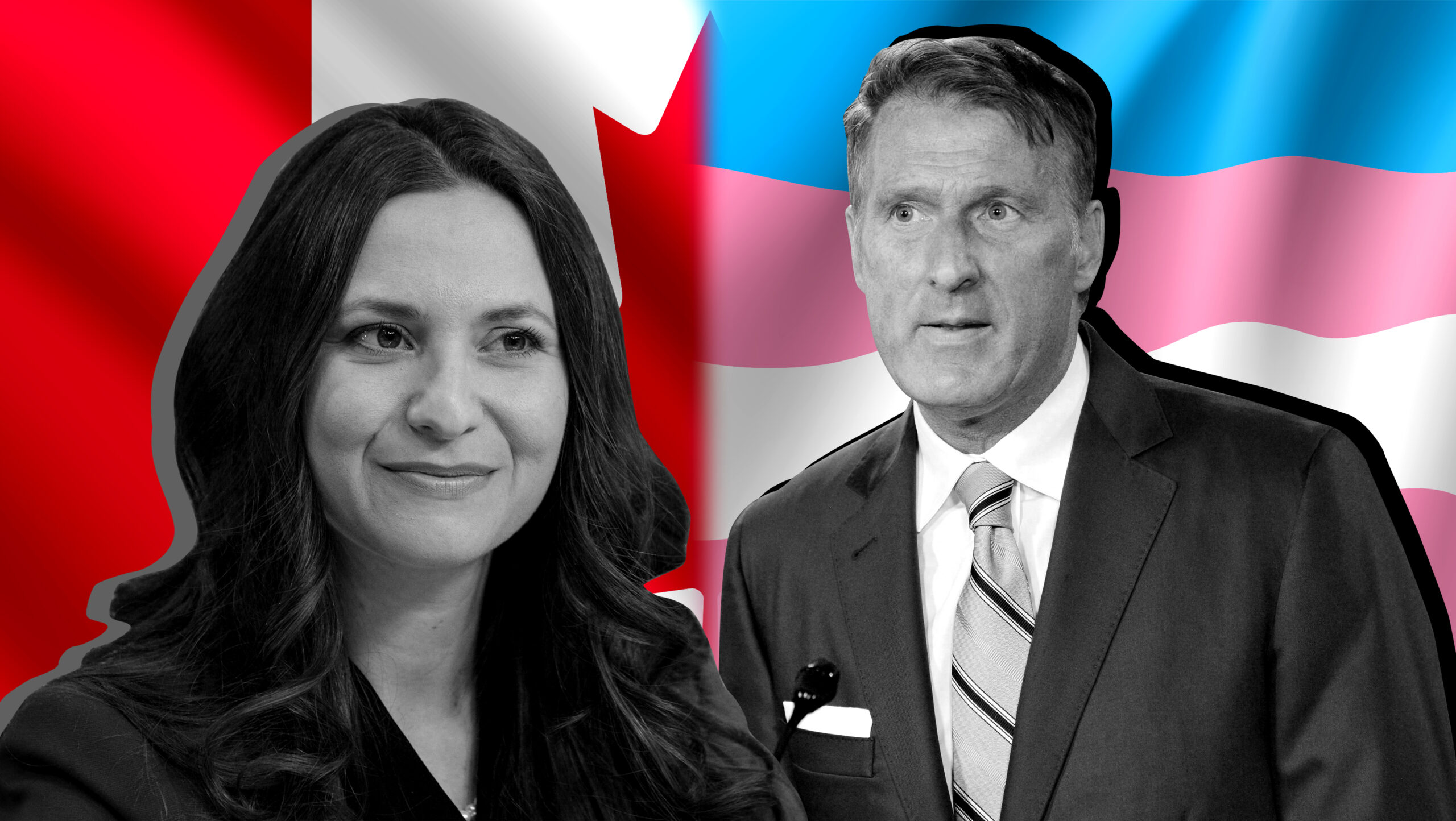Trans people in Canada are accustomed to being the political right’s punching bags, and this year seems to be no different. At the beginning of 2019, Laura-Lynn Tyler Thompson emerged as the candidate for Maxime Bernier’s new right-wing People’s Party of Canada in the BC riding of Burnaby-South. Tyler Thompson — a white, anti-abortion conservative — has argued in the Christian Light Magazine that the idea of gender fluidity is “the greatest and most insidious assault against our children that this nation has ever seen.” She’s so devoted to removing discussions of sexual orientation and gender identity from BC schools that she’s called it her “hill to die on.”
Her language choice mirrors that of the Ontario Progressive Conservatives, who, just months ago, proposed at a party convention to remove gender identity — which former PC candidate Tanya Granic Allen describes as a “liberal ideology” — from Ontario schools and curricula.
That followed months of debate over the repeal of Ontario’s sex-ed curriculum, an action rooted in homophobia and transphobia. In fact, last week, an 11-year-old trans girl told the Ontario human rights tribunal she was nervous to go back to school after the curriculum repeal.
Despite this rhetoric, gender identity isn’t a ballot-box issue. If a 2018 Ontario Ipsos poll is any indication, Canadian voters are most concerned with health care, job creation, climate change and the future of social assistance programs. So how are we to make sense of the conservative fixation on such a small segment of the population?
For Canadian nationalists, these dog-whistle politics of anti-trans fear-mongering are simply an extension of tried-and-true nationalist attacks on queer and feminist organizing. The preoccupation with trans people — and the wrongful depiction of trans people as a threat to the nation’s children, as suggested by politicians like Tyler Thompson and Granic Allen — is a strategic move by conservatives to appeal to their traditionalist bases and a partisan ploy to paint the left and their values and ideas as irrational, ideological and dangerous.
As writer Gwen Benaway writes, “Framing our very existence as a debate and labelling our humanity an ‘ideology’ . . . achieve[s] [the] goal of dehumanizing us.”
Take the notion of “gender identity studies” — the hill Tyler Thompson says she’ll die on. The term has come up most recently in debates over sex-ed curricula, both in Ontario and across the country, where folks like Granic Allen use it to position trans folks as a threat to children’s education. Throughout history, conservatives have claimed that teaching kids about LGBTQ2 folks could lead to indoctrination. The focus on “gender identity” and its apparent contradiction with “science” also harkens back to a time in medical history when trans people were pathologized as unstable, irrational and unnatural.
This language is popular precisely because it allows politicians to position transition, queerness and gender variance as a threat to moral order by invoking concerns for the safety of children. This plays into tired and harmful conspiracies of queer and trans people as unique threats to children — conspiracies that have been thoroughly debunked yet continue to make life unnecessarily difficult for LGBTQ2 youth and their parents.
As writer Gwen Benaway notes, conservatives deploy this threatening, fictionalized image of trans people to present us as an ideology to be repelled, rather than as human beings to be seen and heard. For example, when conservatives misrepresent trans people as threatening toward children, they strategically ignore the vulnerability of trans youth and can avoid having to answer for it. This narrative of an evil trans menace allows conservatives to erase us from their political consciousness and ignore our demands for basic necessities such as fair access to health care, affordable housing and freedom from discrimination. As Benaway writes, “Framing our very existence as a debate and labelling our humanity an ‘ideology’ . . . achieve[s] [the] goal of dehumanizing us.”
The sad fact is that conservatives and Canadian nationalists have a financial and political incentive to demonize trans people in this way. Hating on trans people is a way for the political right to attack the left more broadly. By painting trans people as manipulative liars, politically correct predators, dangerous ideologues and creeping conspirators, conservatives can characterize their demands as criminal or fundamentally unstable.
For political pressure groups like Ontario Proud, which provided massive support to Ontario Premier Doug Ford’s campaign, there’s a strategic push to demonize the left in order to continue to accumulate capital uninterrupted. When politicians avoid recognizing that LGBTQ2 youth homelessness in Toronto constitutes a crisis, for instance, they can present it as an issue of kids gone rogue rather than a preventable problem with socio-economic causes and solutions. That means they don’t need to increase property taxes in order to fund new shelters; they don’t need to raise the minimum wage to match inflation so that people can actually afford housing; and they don’t need to support programs and services for LGBTQ2 folks in low-income neighbourhoods. They win, we lose.
The same pattern is occurring all over the world. In the US, American nationalists attempt to legislate trans people out of existence and paint LGBTQ2 activists as “snowflakes” and “social justice warriors” in order to demonize the entire political left. In the UK, anti-trans rhetoric is a way for conservatives to flex their “British values” and silence pro-labour activism in the age of Brexit. Nationalism and transphobia often go hand in hand.
So much of this political heat falls onto trans people because conservatives are no longer able to attack the traditional targets of nationalism: feminist and queer activism.
In fact, it’s become less palatable for even vocally conservative politicians to express anti-woman and anti-gay hatred. The Conservative Party of Canada (CPC) ended its official opposition to same-sex marriage in 2016, and several high-profile CPC MPs claim themselves to be feminists. But it’s much more convenient to target trans people — a group for whom formal recognition is very fresh and still fragile (the federal trans rights bill only passed in 2017).
This isn’t to say that homophobia is somehow absent from Canadian society. There are countless examples that show that homophobia persists — from elderly queer people experiencing discrimination in long-term care facilities to LGBTQ2 youth facing anti-queer educational curricula. But on the whole, politicians are finding that open homophobia is less acceptable than it used to be; it comes with backlash and criticism, rather than silent assent. And high-profile gestures like Trudeau’s 2018 apology to the queer people purged from government have solidified this cultural shift — though many LGBTQ2 people have pointed out that apologies are largely empty gestures without any accompanying material compensation.
So much of this political heat falls onto trans people because conservatives are no longer able to attack the traditional targets of nationalism: feminist and queer activism.
The same principle holds for overt misogyny. Canada remains an unsafe and unkind country for women (especially women of colour) — consider rates of intimate partner abuse, police negligence around sexual violence and the cruel mistreatment of women struggling with incarceration. Yet as a result of massive grassroots activism around incidents of anti-feminist violence in Canada and photo-op gestures toward equality, mainstream political discourse has experienced a shift. Aggressive anti-feminism is out of fashion on Parliament Hill.
But even these symbolic gestures have become a threat to far-right conservatives who want to get back to the “good old days” of patriarchal institutionalization. Unable to attack the left by targeting women and queer folks, those who fear progressive change have found success in turning on trans people.
And so, for most conservatives (and some liberals), gender identity constitutes a kind of political sticking point that stirs up confusion and fear in many people. This allows politicians to frame matters in such a way so as to position themselves as uniquely enlightened, moral and patriotic, and their opponents as irrational, unreasonable and irredeemably ideological. It’s a safe place to couch their traditionalism and ignore the many socio-economic problems facing disadvantaged people, and the kind of solutions that would be costly for privileged conservatives.
In that respect, Canadian conservatives pick on trans people mostly because they can, at a time when it’s getting harder to pick on gays and women as overtly as they would like. And because open anti-feminism and homophobia is no longer the standard, politicians are searching for a new subject on which to displace their patriarchal anxieties and power grabs.
They pick on trans people because they can. But also because people let them. And that has to change.


 Why you can trust Xtra
Why you can trust Xtra


